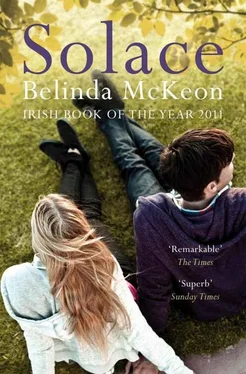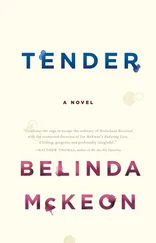Mark’s hands were freckled, already growing brown, though the summer had only just begun to suggest itself, and there was a bony strength to them, a gnarled, awkward kind of strength. For a moment Maura tried to imagine herself as a girl, looking at those hands; tried to think would she be drawn to them, would she look at them and feel herself feeling a certain way, and for that moment she thought she would, and then she realized that Mark was aware of her eyes on him.
‘Mossy,’ he said.
‘What?’
‘Mossy, texting to know if I wanted to go to a gig this evening.’
‘Did you not tell him you were coming down here?’
‘I don’t know,’ Mark said, and it was exactly as he had tried to lie to her when he was a child.
Mossy had a real name. She tried to think of it. Thomas, it must be. Or more than likely Tomás, the Irish, with the end of it sounding so much like moss . He was a nice lad, friendly, but watchful, from what she imagined as a wild sort of family down in Kerry or somewhere. Wild partly because Mossy had huge tumbles of curls, and a face too craggy for his age, and partly because there were a lot of them in Mossy’s family, as far as she could remember, eight or nine of them, she thought. And it wasn’t even that Mossy was the youngest, that he came from parents of that generation, from a mother who would do nothing to stop herself falling pregnant every twelve months; Mossy was nearly the eldest, and the youngest few were still in primary school, and Mark said they all looked alike, hair like that and hard little faces like that, all running around speaking Irish and not giving a damn. As far as Maura could gather, it wasn’t religion that had had Mossy’s mother going around pregnant so often: it was the enjoyment of it, of every bit of it, the bit with her husband and the bit with the child in her and the bit on her back in the hospital, even, and the bit with a whole straggle of youngsters traipsing around under her feet.
Maura would have had more. But more hadn’t been possible for Maura, and that was what she had had to get used to. She was thankful, at least, that there had been one of each.
Meaning she was thankful that one of them, at least, had been a son. For Tom’s sake. But for her own sake, as well. She had wanted a son. She had cried tears of real gratitude when he had arrived.
They were nearing home now. Mark glanced at each house as they passed; habit. Tom always did more than glance: Tom always stared, and from her own kitchen window she had seen others do the same to her porch, her shrubs, her freshly tarmacadamed drive. She saw them taking note of what was new, what was changing, what was theirs to mull over or to mock as they drove on. She herself glanced now at the last few houses before the lane: Bradys, with the trampoline at the back of the house for the grandchildren; Healys, with the pebbledash and the tiny windows; Murtaghs, with the beautiful curve of flowers all along the path to the door. As she turned into their own lane she knew that Mark was tensing; knew that Tom was likely to be at a gate or in a shed door now, listening for the sound of the car, readying himself to look busy and unbothered as it passed him by. All weekend he had been needling her with questions about when Mark was coming, when she had last called him, what it was that could have been keeping him away this long. He asked the same questions over and over, twice a day the same questions, maybe three times. That was habit, too, a habit she should have tried to get him out of a long time beforehand; if he asked about something often enough, it would happen. She would take steps, behind the scenes, to make it happen, for the sake of peace, for the sake of being able to go about her day. And when he asked again and again whether Mark was coming down, he was not trying to torment her, she knew: he was reaching, rather, with a muscle that had worked so often before. He was saying the words, and waiting for them to work. And now they had worked. Now she had brought him his son.
In the kitchen, Mark sat with his parents over a lunch of cod and potatoes and salad, his mother pouring orange squash into the crystal tumblers she had started to use for everyday. The dog, Scruff, sat by the table, hoping for scraps. All through the meal, Tom kept up a steady delivery of local news, much of which Mark had already heard from Maura. But neither he nor his mother let on, listening and nodding and coming in with the right questions, at the right time. Now his father was talking about how Farrell, the vet, had become unpopular lately, how fewer around were using him any more, and how they were calling a new vet, a woman, instead.
‘It’s that or go to one of the foreign lads,’ Tom said, laying butter thick across the potatoes he had peeled and crushed on a side plate. He smirked. ‘There’s nobody left to look after the poor fuckers of cats and dogs now that she’s taken the cattle and the sheep off of Farrell.’
‘Couldn’t Farrell look after them?’
Tom snorted. ‘Look after them with a grocery bag and a shotgun.’ He tore off a small piece of fish and dropped it on the floor. ‘You don’t know how lucky you are, lassie,’ he said to the dog.
‘Tom,’ Maura said, and she rolled her eyes at Mark.
They talked on through lunch and through the slices of the apple tart Maura had made that morning, and when they had drained their mugs of tea, Tom got up from the table and said he would see Mark outside. No mention of work was made. They would talk about the work as they were doing it, and with as few words as possible — words shouted from a tractor cab, nodded over quickly in the lean-to beside the barn. There was a language, and as long as it was spoken fluently the work always got done, but in fact it was less a language than a convoluted dialect, easy to slip into and almost impossible to translate. Mark watched from the table as his father stepped into the back kitchen and knew it was only a matter of hours before they would be roaring at each other, each of them unable or unwilling to understand the meaning of the other. He knew the rota, knew what needed to be done. To his father, it was a week’s work; to him, it was something he intended to have over with in a couple of days. He reached for the pot and poured himself the last of the tea, and took the mug with him as he went up to the bedroom to change.
He pulled on old jeans and a flannel shirt, soft from years of washing but still stained with the shadows of cowshit. The shirt was years old, from when he was in fourth or fifth year at secondary school; everyone had been wearing them then, along with the kind of runners that were in that photograph of Kurt Cobain’s sprawled feet, Kurt Cobain’s dead feet. The kind of runners, come to think of it, that Mark was still wearing now. He pulled them off; they stank of sweat worn into dirty rubber. He rummaged in a drawer for a thick pair of socks.
From the window he could see his father in the yard below, working at the baler with a pair of pliers. He was tightening the pins below their metal shields, bent over the pick-up reel like a quilter tweaking his threads. By now he had lost almost all of his hair. The gleaming tan of his crown, its spray of dark freckles, was somehow disorienting. He was not old, and certainly not frail, but he carried about with him the indemnity clause of seeming an older man than he actually was; a cloud of anxiety that asked to be met with solicitude, attention, a kind of anticipatory grief. The trace of warmth on his skin, the healthy brownness of him, complicated this picture, even for all the hours working in wind and rain to which it actually attested. On the baler he worked deftly, moving between the parts without hindrance, without once seeming to linger, his tools neatly laid on the ground by his knee. Now he reached back into those tools for the thing he needed — the ratchet wrench — without even having to look.
Читать дальше












